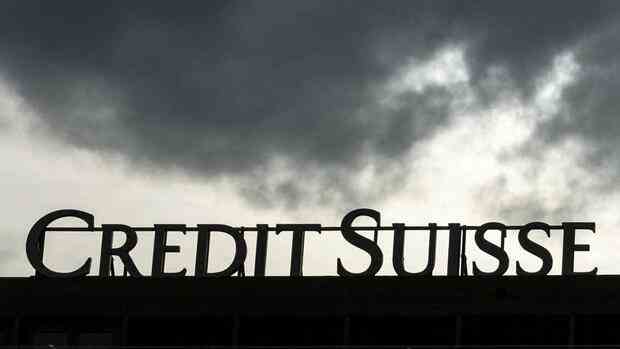The market panic in bank stocks hit the big Swiss bank with full force.
(Photo: Reuters)
Zurich The bankruptcy of the Silicon Valley Bank (SVB) hit the crisis bank Credit Suisse with full force: the premiums for credit default insurance for bonds from the second largest Swiss financial institution climbed to a record high of 4.53 percentage points on Monday, according to data from the Bloomberg financial service.
This means that investors who want to protect themselves against credit defaults with Credit Suisse for five years now have to pay 4.53 percent of the sum to be insured as a premium. The premiums for such financial products known as “credit default swaps” (CDS) are a much-noticed crisis indicator.
The bank’s share price also fell by more than 15 percent on Monday. The titles were briefly suspended from trading several times, as a spokesman for the stock exchange operator SIX confirmed. This is a routine intervention in volatile market phases. The Swiss stock exchange suspends trading in a share for five minutes if the price deviates from one trade to the next by more than 1.5 percent. The rule is designed to prevent extreme market movements and flash crashes.
The Credit Suisse shares were punished even more severely than their direct competitors. In the meantime, the share was listed at 2.1 francs – and thus at a record low.
UBS shares fell more than eight percent on Monday afternoon, while Julius Baer lost seven percent. A Zurich top banker said on Monday: “There is no reason why all banks are crashing now.” Credit Suisse and Co. were “wrongly” dragged down by the US bank crisis.
More reports on the consequences of the SVB bankruptcy:
But the nervousness of the financial markets is extremely inconvenient for Credit Suisse: After a series of scandals, the financial institution is in the middle of a complex and expensive corporate restructuring. The share price is now listed below the subscription price of the capital increase carried out last October. The new Arab major shareholders are now also in the red – a scenario that the Credit Suisse management wanted to avoid at all costs.
Credit Suisse is fighting against outflows of funds
The major Swiss bank is also desperately trying to avert damage to its core business, asset management. After the capital increase in October, the bank had to deal with a crisis of confidence in which many wealthy customers withdrew money. At the beginning of February, when the quarterly figures were published, the bank had to admit that the outflow of customer funds had not yet been completely stopped.
In addition, Credit Suisse had to postpone its annual financial statements last week due to questions submitted at short notice by the US Securities and Exchange Commission. All of this is unlikely to have done much to restore the trust of wealthy clients in Credit Suisse. Corporate customers may even be forced to transfer cash to other banks in the face of record-high credit default premiums.
At the Silicon Valley Bank, the focus has recently been on high losses on the bond portfolio, which should be held to maturity. When the SVB was forced to realize these losses and raise fresh capital to compensate, it triggered a bank run that brought the financial institution to its knees at record speed.
Credit Suisse reported CHF 975 million of held-to-maturity bonds in the third quarter of 2022. These are exclusively foreign government bonds. Compared to the cash reserves and central bank balances of 137 billion francs, the bond portfolio is not significant.
The bust bank SVB was different: It invested money from customer deposits in bonds worth more than 90 billion dollars and pushed them into a portfolio to be held to maturity – a hundred times more than the much larger Credit Suisse.
More: US Markets – Bank stocks fall significantly in value
